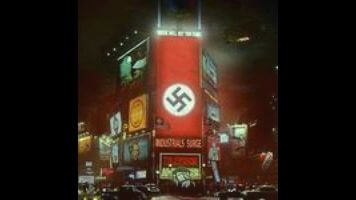Nearing mid-season, The Man In The High Castle piles up its mysteries

When the previous episode ended with Tagomi mysteriously absent from his office, it was almost a given that “Escalation” would open with another visit to an alternate reality, and so it does. This time Tagomi finds himself in a house with cherry blossoms visible from the windows. Is this a home he previously had in Japan, or one that an alternate version of himself currently owns in another world? That question would appear to be answered when a woman who is presumably his wife, long dead in the show’s prime reality, returns home, but just as she turns to face him, Tagomi finds himself back behind his desk.
Tagomi’s efforts to convince General Onada of the dangers of his plan for transporting radioactive materials continue to fall on deaf ears, as the General is not impressed with the photos of Washington DC’s destruction Tagomi has provided him. Having observed this confrontation, Kido takes advantage of the situation for reasons not yet clear. He takes the General out for drinks and gets him good and toasted before coercing him to stamp his seal on a “routine order” that is surely anything but.
Whatever it is will have to wait, as The Man In The High Castle has more mysteries to set in motion as we approach mid-season. On the east coast, Helen Smith learns that her kindly neighborhood doctor has suddenly dropped dead, and it doesn’t take long for her to connect the dots that lead directly to her husband. John Smith informs her of their son’s medical condition and assures her he can keep Thomas safe. How exactly he plans to do this is another matter for another time, although it may involve Juliana, who is being tutored for her citizenship test by Thomas. She’s also on the trail of George Dixon, Trudy’s real father who may hold the key to San Francisco’s survival. In the course of tracking him down, she runs afoul of another mystery man who recognizes her immediately. In the end, Dixon does turn up (in the person of Tate Donovan, who you may recognize from every television show ever), but whatever he has to say will have to wait. (Sensing a pattern here?)
In Berlin, Joe’s adventures are beginning to remind me of James Hurley’s misbegotten noir road trip from season two of Twin Peaks. He’s asked his father for permission to return to New York, but the mysterious Nicole Dormer (pretty much every new character introduced in these last couple of episodes is “the mysterious” so-and-so) just happens to show up in his hotel lobby. They have a drink, she tries to talk him into staying, and leaves him with a kiss. She’s no doubt up to something, possibly in concert with Joe’s father, but it all feels detached and (as with most things Joe) a little duller than it should.
Back in San Francisco, Frank Frink is born again hard. He’s so caught up in his new identity as a Resistance hero, he keeps brushing off the important task at hand: working with Ed on the artifact they need to make in order to start paying down their Yakuza debt. Poor Ed is everyone’s punching bag these days, which must make him wonder whether it was really worth being sprung from jail. The centerpiece of the Resistance storyline this week is a mission to retrieve explosive material from a bomb in the basement of a building. This is the sort of caper this show doesn’t do often enough, and it shows: what should have been a tightly-wound suspense sequence is rendered in perfunctory fashion, with only a few tense moments involving Frank drilling into the bomb. The team gets in and out of the building way too easily, and they never attract attention during the whole operation. At least Frank and Sarah get to enjoy a stress-free roll in the hay afterward. It appears that Juliana is long-forgotten, so good for Frank. It might be a wise idea for him to remember his debt to the Yakuza at some point, though.
Stray observations
- This episode was written by Wesley Strick, a hot screenwriter of the early ‘90s (Cape Fear, Arachnophobia) who has been off the radar for quite a while. He did have a hand in the 2010 Nightmare On Elm Street remake, for what that’s worth.)
- We’ve now gotten several glimpses of the way United States history is taught in the Reich, and the emphasis is noticeably different from the way most of us learned it in school. There’s no tiptoeing around the inconvenient fact that most of the Founding Fathers owned slaves, and the extermination of the indigenous people is front and center on the citizenship test. As always, history is written—and rewritten—by the winners.
- One thing the alternate version of World War II had in common with the real one: Japanese-Americans were held as “enemy aliens” in relocation camps. As Sarah tells Frank, she was one of them.